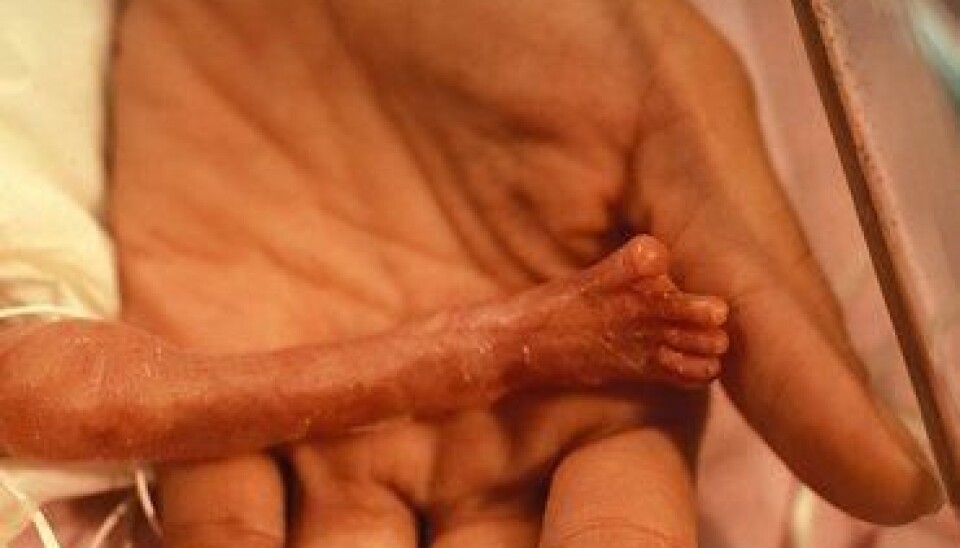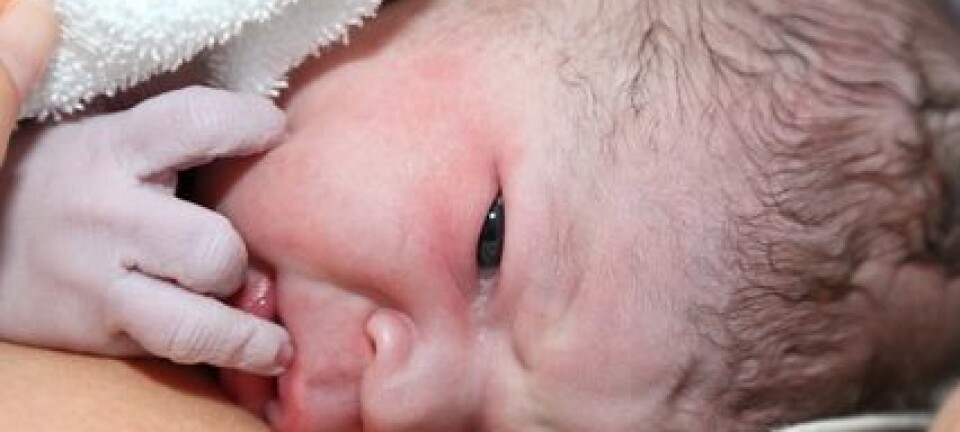An article from University of Oslo

Salt against blood poisoning
Why do premature infants develop blood poisoning if they receive a lot of nutrition? The salts phosphate and potassium are likely suspects.
Denne artikkelen er over ti år gammel og kan inneholde utdatert informasjon.
Do premature infants get enough nutrition right after birth?
Professor Christian A. Drevon thinks they don't. He and his colleagues have shown that tissue in premature neonates can grow quicker if the infants are given more nutrients, which makes them bigger and more functionally proficient. The problem is that this leads to a high incidence of blood poisoning.
How can this dangerous condition be prevented, while at the same time ensuring that the neonates get enough nutrition for optimum development of their brain and other tissue?
"By adjusting the salt concentration", says Drevon.

Premature infants have underdeveloped tissue. The immune system is especially weak. This means that even a quite harmless bacteria can become a lethal intruder.
Infections grow quickly in bodies with low resistance, resulting in blood poisoning. If the levels of phosphate and potassium can be kept normal, blood poisoning can likely be prevented.
Too much of a good thing
If a starved body gets a lot of food at once, it can collapse. This is well-known from areas with famine. Emaciated people who suddenly get a lot of food in a short time, can get an infection and die. Experts call this "refeeding syndrome". Though it is a well-known phenomenon, it has not previously been described in premature infants and has been poorly understood until recently.
The salts phosphate and potassium are crucial if our bodies are to function normally. Too low salt levels especially affects a type of white blood cells that are important in the defence against bacterial infections.
The study of premature infants is based on a hypothesis that premature infants with birth weights of as little as 450 grams get too little nutrition after birth to develop normally.
An infant who weights no more than a tub of margarine needs a lot of nutrition to catch up on the growth gap. Traditionally, doctors have been sceptical about giving premature infants too much nutrition, fearing that their metabolism cannot handle it. The effect of this is that the infants likely get too little nutrition, which harms the brain especially.
When everything is as it should be, newborns lose weight immediately after birth and then gain weight steadily thereafter. If there are interruptions in the growth curve, alarms should go off.
"Our previous studies show that premature infants have two interruptions in the growth curve in their first nine weeks", says Drevon.
This indicates that something is wrong.
More nutrition leads to better growth
If infants do not get enough building blocks, this will likely also affect their brains.
Drevon believes that if we can prevent the interruption of the growth curve, we can probably get children with better brains. In other words, there are very good reasons to give premature infants the nutrition that many have recommended but never dared provide.
Not until Drevon and his colleagues tested it.
"We saw significantly better growth in the children in the intervention group compared with the children who received a traditional nutrient supply."
Yet there was a draw-back.
Extra supply of phosphate and potassium
The study conducted at the Faculty of Medicine, Oslo University Hospital and Akershus University Hospital showed that infants who received an increased amount of nutrition grew well, but developed blood poisoning more frequently than other newborns. What is the cause of this?
Most likely, the refeeding syndrome has struck.
The trick in preventing this is to monitor the level of potassium and phosphate while supplying the essential fatty acids and amino acids building blocks to ensure that the brain develops as it should.
In other words, the solution is likely to adjust the salt concentration. Just like that, blood poisoning no longer has such favourable growth conditions.
The body has its own defence forces in the white blood cells that quickly mobilise when there is injury to tissue.
These eat bacteria and destroy intruders. However, when the phosphate level drops, the white blood cells are put out of commission. Adding extra phosphate and potassium can therefore prevent blood poisoning.
But why does the salt concentration in newborns fall when they are building more tissue?
Drevon explains that this is because the salts contribute to building tissue.
"When you build a house, you need nails. When you build tissue, you need phosphate and potassium", he explains.
Potassium is inside the cells, and with an increased cell mass we need more potassium. Phosphate is used in many parts of the metabolism, and the need for it increases as new tissue increases.
The critical phases
All organs need building blocks to grow. The body produces some building blocks itself, while others must be added from the outside; the latter include essential fatty acids and some amino acids.
Just as buildings become shaky if their foundation and frame are incomplete, children become fragile when not all building blocks are in place.
From conception, there are specific phases in which the brain and the rest of the body develop. If the process is disturbed in a critical phase, the damage may be permanent.
"There is some degree of plasticity", Drevon explains.
"However, the body cannot compensate for everything. It is therefore important to add the necessary building blocks in the critical phases."
Studies show that seriously premature infants born as early as midway through the expected duration of a pregnancy are more likely than other children to struggle with reading problems, hyper activity, attention deficit problems, cerebral palsy and dropping out of school. They are more likely to be disabled as adults.
Drevon believes that we can prevent these sad cases by a more optimal supply of nutrients, including phosphate and potassium.


































